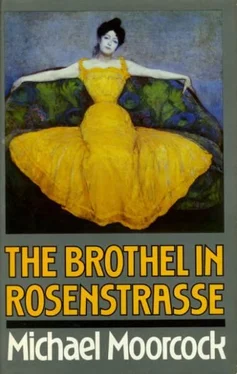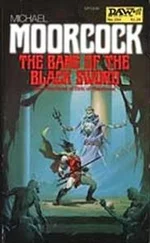Michael Moorcock - The Brothel in Rosenstrasse
Здесь есть возможность читать онлайн «Michael Moorcock - The Brothel in Rosenstrasse» весь текст электронной книги совершенно бесплатно (целиком полную версию без сокращений). В некоторых случаях можно слушать аудио, скачать через торрент в формате fb2 и присутствует краткое содержание. Жанр: Эротические любовные романы, на английском языке. Описание произведения, (предисловие) а так же отзывы посетителей доступны на портале библиотеки ЛибКат.
- Название:The Brothel in Rosenstrasse
- Автор:
- Жанр:
- Год:неизвестен
- ISBN:нет данных
- Рейтинг книги:3 / 5. Голосов: 1
-
Избранное:Добавить в избранное
- Отзывы:
-
Ваша оценка:
- 60
- 1
- 2
- 3
- 4
- 5
The Brothel in Rosenstrasse: краткое содержание, описание и аннотация
Предлагаем к чтению аннотацию, описание, краткое содержание или предисловие (зависит от того, что написал сам автор книги «The Brothel in Rosenstrasse»). Если вы не нашли необходимую информацию о книге — напишите в комментариях, мы постараемся отыскать её.
The Brothel in Rosenstrasse — читать онлайн бесплатно полную книгу (весь текст) целиком
Ниже представлен текст книги, разбитый по страницам. Система сохранения места последней прочитанной страницы, позволяет с удобством читать онлайн бесплатно книгу «The Brothel in Rosenstrasse», без необходимости каждый раз заново искать на чём Вы остановились. Поставьте закладку, и сможете в любой момент перейти на страницу, на которой закончили чтение.
Интервал:
Закладка:
worm to the man. And another scrap: He is not what I imagined him to be. I am beginning to shake. ‘You are a fool!’ I say. ‘For you could have become what I imagined you to be. You have ruined any possibility of that now. What a woman you might have been.’ It is my failure. I feel it as a painter might experience a failure of creativity. It is as if half my own flesh has been torn from me, half my mind stolen. The guns batter my past into the dust and my future has run away into the ruins. I am so horribly betrayed. And it is my own doing. My anger comes on me suddenly and I begin to rip at her dresses, her underwear, her aigrettes, stamping on her little shoes, flinging silk and lace and feathers into the air until my tiredness causes me to collapse, sucking at a hand I have somehow cut, in the middle of the debris. I have tried to destroy everything which reminds me of her, which hurts me. I poured so much of myself into that valueless vessel. As I squat there, weeping and shaking, Clara enters the room. She is wearing a patterned tea-gown over her nightclothes. She moves here and there, replacing ornaments, clearing up broken china and glass. ‘She’s taken every piece of jewellery,’ she says. I moan at her to go away. She stands looking down on me. ‘Have you hurt yourself badly?’
‘No.’
She closes the door behind her.
When, at length, I return to Clara’s room she is asleep again with the sheets drawn over her head. I take off my jacket and my waistcoat and go to sit in the armchair near the window. I cannot sleep. Every time I close my eyes I am filled with bitter images, with a yearning for the recent past and all the happiness I have lost. Mirenburg is gone. Papadakis grumbles at me as he brings back the clean chamber pot. ‘You’ve pissed in the bed again,’ he says. ‘I know it. I can smell it.’
He has made me stand, leaning on the table and trembling, while he gathers up the soiled linen. ‘I’m going to bring the doctor in the morning.’ Now the bed is clean. Through the open window comes the smell of hyacinths and the sea. Mirenburg no longer lives; she is a grey memory. She has been biding her time, hiding in a neurasthenic slumber while she waited for the best which would be offered to her: a kind of hibernation because she did not want to accept my offer but was afraid to refuse it, afraid to take any action. What had Diana promised? I doubt if it was anything than a more glamorous, if less realistic, plan of escape. Stefanik’s balloon? I get out of the chair. My legs are weak. Clara turns, casting off her covering to hold out tolerant arms. Her face is full of controlled sympathy. How can she forgive me? Why do women do this to us? I begin to weep again. ‘We are going away this evening,’ she says. ‘It is all arranged with Frau Schmetterling. We will take Elvira. Wilke will be with us. How did you plan to escape from the city?’ Still snivelling, I tell her about the underground river and the sewers.’ She pats my shoulder. ‘Not bad. It could work.’ Eventually I go to sleep. I am awakened by an explosion. From somewhere within the house I hear voices shouting and the crash of falling plaster. It is dark in the room. I lie on the bed and wait for the next shell. Instead the door opens and Clara stands there, an oil-lamp raised in her hand. Frau Schmetterling is with her. The madam holds something in her hands. It is a bloody, palpitating chow-dog. ‘They have killed Pouf-Pouf,’ she says flatly. ‘And this poor little one is dying, too.’
Clara is already in her outdoor clothes: a black and grey tailor-made. Over this she draws a plain cloak of the sort peasant women wear. She points to a bundle at her feet. ‘Here are some of ‘Mister’s’ clothes. They should fit you. You’ll have to leave your wardrobe behind, my dear.’
I have become pliable and obedient. The dog begins to groan. Frau Schmetterling whispers something to Clara and then returns downstairs. I receive a strange feeling of satisfaction as I pull on the rough garments; it is almost as if I shall wear sackcloth in mourning for Mirenburg and my slain imagination. ‘I want reality so badly,’ I tell Clara. ‘She was won over by nothing more than a fantastic promise.’
‘Very likely.’ Clara helps me button the coat. ‘Do you still have the map?’
I give it to her. ‘We’ll put Wilke in charge, I think,’ she says. ‘At least for the moment. Are you feeling any better?’
‘I want reality,’ I tell her.
‘This is reality enough for anyone.’ She is humorous. ‘But I’m sure you’ll find a way out of it. I trust your instincts for that. Lead the way, your lordship.’
We leave, the four of us, in the night. In Rosenstrasse we have to pass two soldiers who are still alive, though their bodies are dreadfully mutilated. They call out to us for help. ‘I’ll deal with them,’ says Frau Schmetterling, hurrying us forward.
Wilke and I raise the cover of the manhole. He goes first, swinging the lamp we have brought with us. Our shadows slide this way and that on the moist stones of the shaft. The metal ladder leads us down into the old watercourse. Elvira is too small to keep her head above the water, so I raise her on my shoulders. Throughout this journey I will find a kind of delicate consolation in being allowed to tend to the child’s needs and will catch myself occasionally using the same kind of words and gestures used by ‘Mister’ in his conversation with her. We wade through shit and corpses to some sort of liberty, emerging on the fringes of the Moravian inferno and joining lines of refugees stumbling towards the cleaner air of a countryside stripped of all its wealth. We walk steadily for two more days until we cross the Bohemian border and are able, with the gold Frau Schmetterling has given us, to get a train to Prague where we separate. Wilke will take Elvira to England. I still have no volition and allow Clara to make every decision. We go first by train to Berlin and the hospitality of my brother Wolfgang, who congratulates me on the charm and the breeding of my English fiancée. Within days, of course, we are taken up by Society. Everyone must hear of our experiences. I recover myself sufficiently to present at least an acceptable facade and I speak with authority of the suffering and destruction I have witnessed. I am asked to write the articles which become that silly book The 100 Day Siege: A Personal Record of the Last Months of Mirenburg. I mention nothing of any real importance to me, but for a while I become a hero.
Holzhammer’s villainy is the subject of a thousand editorials. He is called the Butcher of Mirenburg and the perfidy of Austria-Hungary has shocked, we read, the entire civilised world. But Holzhammer rules and Badehoff-Krasny is exiled and the diplomats gradually do their seedy work so that the Peace of Europe is maintained for a few more years. And Mirenburg is gone. I hear many rumours, but there is no news of Alice. I will talk to anyone who has a grain of gossip. It is still hard for me to accept that so much beauty has vanished as a result of trivial political decisions. There will never be a brothel like Frau Schmetterling’s in Rosenstrasse, for there will never be another Mirenburg, with its history and its charm. And psycho-analysis has made us too self-conscious. This is an age of great remedies; they seem to believe there is a cure for human greed. There is not. But neither should the greedy be condemned. They should merely be guarded against. Greed is not evil. What is evil is the manipulation of others in order to satisfy it; the quest for power. That is the crime. Do you hear me, Papadakis? He is still shuffling about in the shadows.
Will you read this, Alice, in your Geneva home? Or did you die with the others in Mirenburg? I could not find you. In London and Dublin we thought to discover news of Lady Cromach, but she had not returned. Someone said she had changed her name ‘because of certain scandals’ and might be living in Paris. But she was not in Paris. And as for Princess Poliakoff, all we heard of her was that she could have gone to India. They said that on Sunday, 19th December 1897, when Holzhammer’s troops arrived at Rosenstrasse, Poliakoff had sat in her old lover’s carriage and directed the mercenaries into the brothel. I can imagine with what pleasure the Bulgarians took our ladies (‘All they found later was a pile of bloody lace’). Baby is crying, Lady Cromach used to say. Baby is angry. Rakanaspya was killed, probably by the Austrians. Count Belozerski was wounded but managed to return to Kiev where I believe he still lives, writing about factories. Baby is crying. We are lost. Deserted. That which comforts us grows old and dies. We long to recapture it; the security of childhood, the attention of others. Clara was familiar with Lady Cromach’s remarks. But she was not so tolerant of Baby. ‘Sooner or later,’ she said to me, ‘that baby’s crying becomes an irritant to our adult ears. It is then we have the right to turn upon the weak and with all due ruthlessness squeeze the life from a silly, mindless creature. If we are to survive, Baby must be destroyed.’
Читать дальшеИнтервал:
Закладка:
Похожие книги на «The Brothel in Rosenstrasse»
Представляем Вашему вниманию похожие книги на «The Brothel in Rosenstrasse» списком для выбора. Мы отобрали схожую по названию и смыслу литературу в надежде предоставить читателям больше вариантов отыскать новые, интересные, ещё непрочитанные произведения.
Обсуждение, отзывы о книге «The Brothel in Rosenstrasse» и просто собственные мнения читателей. Оставьте ваши комментарии, напишите, что Вы думаете о произведении, его смысле или главных героях. Укажите что конкретно понравилось, а что нет, и почему Вы так считаете.







